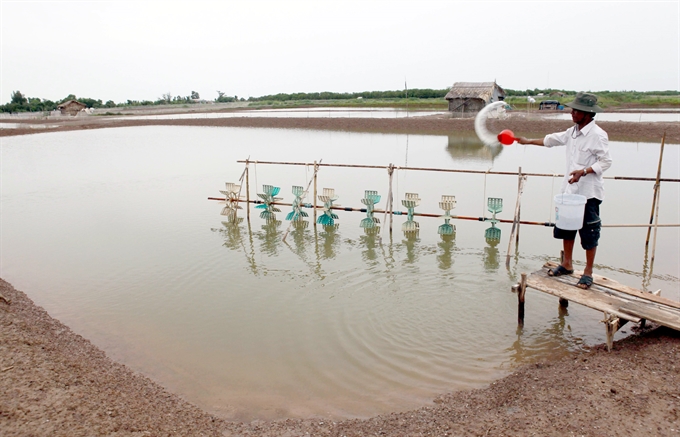 Society
Society

The lives of thousands of farmers in the Mekong River Delta that depend on “rising-water” season are threatened by the possibility that the floods will not come this year.
 |
| A Khmer ethnic minority farmer raises shrimp in the southern province of Bạc Liêu’s Hòa Bình District. The livelihoods of thousands of farmers in the Mekong River Delta are threatened as the floods may not come this year. — VNA/VNS Photo Trần Việt |
HÀ NỘI — The lives of thousands of farmers in the Mekong River Delta that depend on “rising-water” season are threatened by the possibility that the floods will not come this year.
It is likely that many fishermen will have to shift from fishing to farming or leaving their homeland to look for other jobs.
This has added to the woe of farmers in the delta who have endured the most serious drought in 60 years that has damaged 200,000ha of rice, about 9,000ha of orchards and 2,000ha of aquatic farms.
According to experts, decreased river flows caused by upstream dams and a change in climate patterns have led to saline intrusion, barren soil and increased agricultural production costs.
They also warned that the livelihoods of millions of farmers who rely on agricultural production and fishing would be affected.
The Mekong Delta with over 18 million people is an important economic region of Viet Nam. The delta’s accounts for 95 per cent of the country’s total rice production, while it also supplies the country with 65 per cent of its aquatic produce and 70 per cent of its fruit.
The floods normally begin in September and end in November or December.
The floods bring alluvium as well as fish and other aquatic creatures into paddy fields, enabling farms to perform aquaculture every year.
Farmers anticipate the floods as they allow more silt into the fields, wash away chemicals and other pollutants, and kill pests so that the next rice crop will yield a better harvest.
Without the floods, farmers would have to spend more on fertilisers and pesticides, experts said.
Nguyễn Văn Tùng, a farmer from An Giang Province’s An Phú District, said fishermen in the region were suffering losses as the amount of fish caught this year was one third of last year’s figure due to the low water levels.
Trần Văn Út, another fisherman, said last year he caught 30kg of fish a day, earning VND300,000-400,000 (US$13.5-18). But now he only catches about 12kg of fish a day, saying that his family was struggling to make ends meets.
Lê Anh Tuấn, deputy head of the Research Institute for Climate Change at Cần Thơ University said the river bed had become rapidly deeper compared with previous years.
He blamed it on over exploitation of sand in the Mekong Delta and the building of dams on upstream rivers.
The scope of erosion also came as a result of low water levels, experts said.
Statistics from Đồng Tháp Province’s Department of Natural Resources and Environment showed that riverbank erosion was over 35km last year. The loss was estimated at over VNĐ31 billion (US$1.4 million) with up to 2,141 households in erosion-prone sites.
Doctor Dương Văn Ni from Cần Thơ University said the risk of erosion in the Mekong Delta would be higher if floods did not return.
He also warned that the drought would be severe in the next few years if floods didn’t occur, adding that farmers who relied on natural aquatic exploitation would have to change their jobs.
Long-term solutions
Due to the exhaustion of fresh water, restructuring plants towards using less water and shifting to other occupations were the best solutions for the Mekong Delta region, experts said.
“Farmers in An Giang as well as other provinces in the Mekong Delta can’t only rely on available natural resources, but will also have to restructure production, intensify non-agricultural services and increase the value of agricultural products,” said Trần Anh Thư, director of An Giang Province’s Department of Agriculture and Rural Development.
Farmers in An Giang Province were advised to focus on products like rice, fish, pharmaceutical plants and other crops which were in high demand, he said.
The province also encouraged the establishment of high-technology agricultural farms and cooperatives.
Nguyễn Thị Kiều, deputy director of Cần Thơ City’s Department of Agriculture and Rural Development, said the department coordinated with the Department of Labour, Invalids and Social Affairs to open vocational training classes for fishermen so they could change their jobs more easily.
Kỳ Quang Vinh, head of Cần Thơ City’s Climate Change Monitoring Office, suggested that the Mekong Delta reserve water, especially in the rainy season, to boost their ability to adapt to climate change.
This was also shared by other scientists, who stressed that it was necessary for the Mekong Delta to set up a management plan to adapt to climate change. Accordingly, the region should build reservoirs along major rivers and channels. Those reservoirs - the so-called flood control areas – were not for local residency and should be used as targets for tourism development and aquaculture production. — VNS